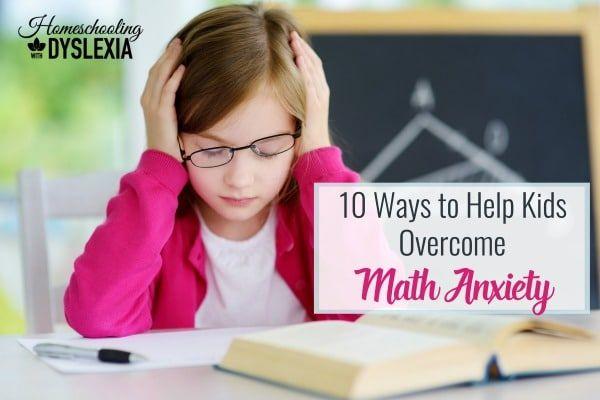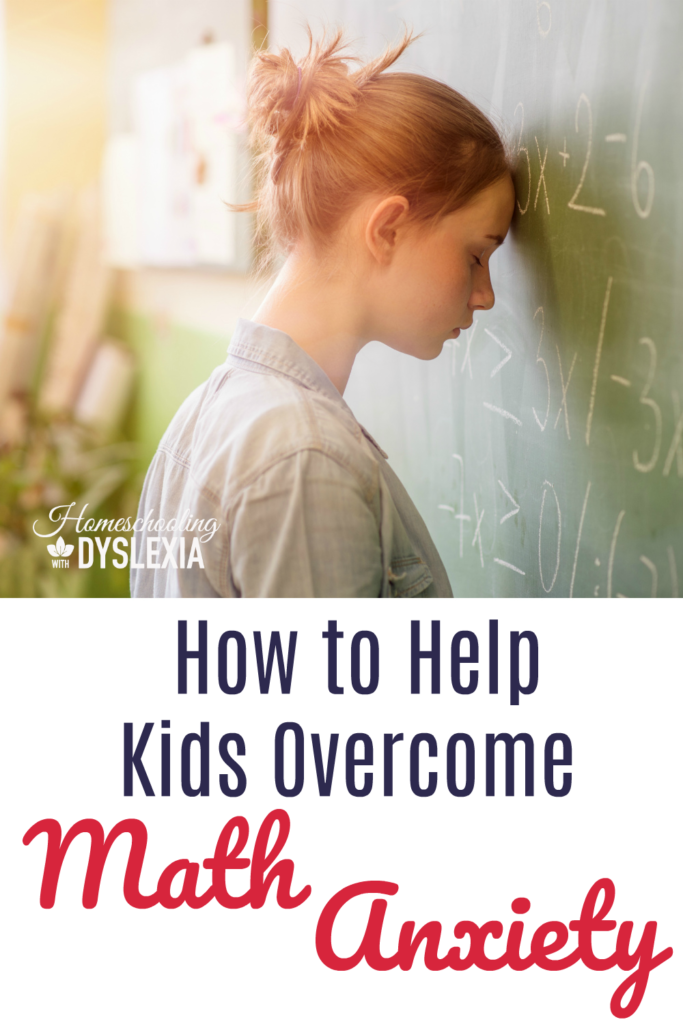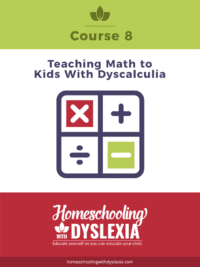For kids who struggle with math – the ones who have trouble with math no matter what they try – it is not uncommon to feel anxiety when even simply thinking about math. As the mom of a handful of kids who struggle with math, sometimes called dyscalculia, I have had a ton of practice helping them not only to figure out how to solve math problems but to overcome their unnecessary worrying about math. Whether your child is six or 16, these 10 tips will help them to build their confidence and ability in math class.

10 Ways to Help Kids With Math Anxiety
Normalize their challenges. I often laughingly refer to myself as my kids’ life coach. How encouraging is it to a struggling learner to hear that many students have a hard time with math. Research shows that up to 50% of students nationwide are experiencing some degree of math difficulty. Remind kids that “All kids can learn math, we just need to figure out how you learn best.”
Read this post on learning styles for more information on the different ways kids learn.
Play math games. Playing games calms kids who are naturally math anxious and allow them to practice skills in a non-threatening environment. Games also tend to be more engaging than your typical math curriculum and engage multiple senses which speeds learning.
Encourage questions. When your child comes to you exasperated with a math problem or assignment, resist the temptation to tell them what to do, rather ask a question. What do you think you should do? Why? Is there another way to solve this problem? What is the problem asking? Don’t be too quick to help them out. Once they realize that they can figure out how to solve math problems by thinking them through, their confidence will grow.
Remember the concept of a growth mindset. Research has shown that when parents or teachers praise a child’s level of effort rather than their level of success or correctness kids respond by developing a growth mindset – or the belief that they can learn and that they are not limited by a set amount of intelligence.
- Read more about what a growth mindset is here and
- how to teach your kids how to have a growth mindset here.
Slow down. Research has shown that timed tests in the early years were a major turning point for many students who needed more time or needed to understand what they were learning as opposed to simple rote learning. Stanford professor, Dr. Jo Baker, talks about the importance of teaching math strategies over math speeds.
Remediate but allow accommodations. While our kids are school aged, particularly in the elementary years, it is wise to continue to remediate areas of weakness that we observe in our kids. We practice math facts just as we may have our kids with dyslexia practice reading fluency or learning sight words for reading. As time goes on, when appropriate, we introduce assistive technology and other accommodations that help our kids to compensate for their areas of weakness.
Read more about accommodations here.
Specific accommodations for kids with dyscalculia include:
- work in short sessions with frequent breaks
- encourage kids to get up and move during breaks
- encourage kids to talk through their problem solving
- extra time on tests
- allow the use of a calculator when not being tested on computation
- allow the use of a math fact chart
Keep realistic expectations. Not everyone is a mathematician and at some point, we may do well to let go of unrealistic expectations in this area. It’s no secret that many of us don’t use advanced math in our daily lives.
Teach them at their level of ability. Math is foundational in that it needs to be taught step by step and if there are gaps in the foundation, understanding will be more difficult and frustration and anxiety will follow. As homeschool parents, we have the freedom to teach our kids to mastery, not simply moving them ahead by grade levels. Don’t be afraid to have a child repeat a level of math.
Hire a tutor. Sometimes having a new face, not so closely related, can give a child with math anxiety some extra motivation and encouragement.
Believe in them. Express that you are confident, not only in your child’s ability to learn math but also in your ability to help them. Often when a child feels the stigma of being ‘bad at math’ is lifted, they can begin to focus more on learning.
Educate yourself so you can educate your child!
Take a class. Teaching Math to Kids With Dyscalculia is a one-hour, online, parent class full of the latest research and tons of effective teaching tips for kids who struggle with math.








Do you have any favorite games to solidify the addition, subtraction, multiplication, and division facts? I sometimes feel like it’s two steps forward – one step back.
I’m finishing up my list of math resources this morning! I’ll post the link here when it is finished!
Great article, it seems you always know what to post about that is what we’re struggling with.
I’m not sure if my son has dyscalculia or not. He does have dyslexia. In math he seems to understand the big picture of things, but can’t remember the names of the numbers without a lot of review. Does that seem like dyscalculia to you?
Hi Rebecca. I’m glad the article was helpful to you! Here is a link to a post with more information about dyscalculia.
It has lists of signs of dyscalculia.
My brother has been looking into getting his son in a class that will teach math with drawing. The class his son is in right now makes his son nervous and is doing little to teach him as well as drawings may. He would love knowing that his son doesn’t need to reach unrealistic expectations because this would relieve the stress his son feels.
Thank you for all the ways to help kids with math anxiety. I have noticed that my son is having a really hard time with math lately. I would love to help him like math. I really like your tip about playing math games. It is true that a game would be more engaging than a math class room.
My youngest started showing signs of anxiety when she was around three. Her worries brought hard questions, behaviors, and many late night chats, all of which sent me into my own panic. Online programs, books, and apps have not only helped us manage our anxiety, but they’ve also shaped the way we homeschool. Thanks for this amazing article!